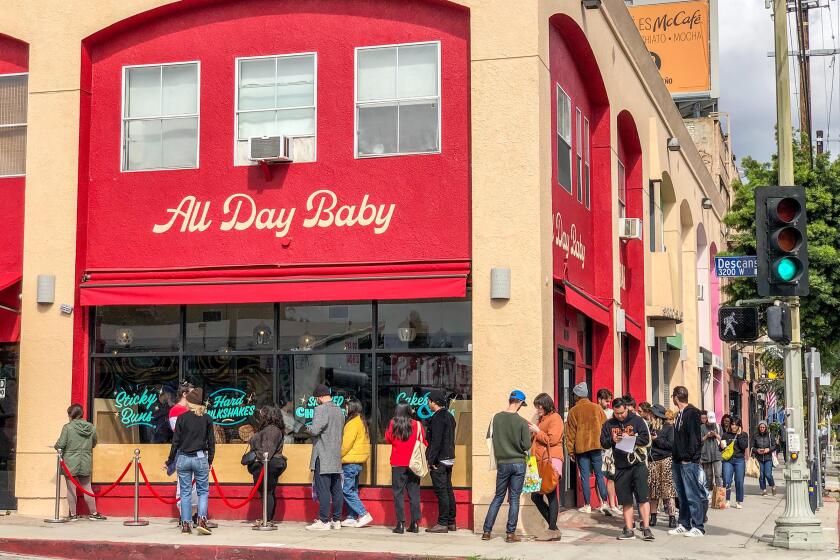End of the Line
- Share via
It’s not the food they’ll miss so much as the place, with its wobbly tables and dark, mission-style furnishings, even though they’ve complained about the odd decor for as long as anyone can remember.
Clifton’s Cafeteria in Laguna Hills was never really about dining, despite the however-many elderly customers who, three times a day for the last however-many years, turned it into their personal dining room and devoured their favorite push-tray choices of chicken and dumplings or ham hocks and lima beans.
Truth is, those who know say, the little cafeteria always stood for something bigger. Going to Clifton’s, wedged between a drugstore and a store selling orthotic footwear, was about making a connection. For 12 years, since the chain restaurant opened across the street from Leisure World, senior citizens have accounted for 90% of the cafeteria’s clientele.
Being there, more so than eating there, became a habit for most of its customers. Which is why, owner Robert Clinton suspects, loyal customers reacted so emotionally when he announced two weeks ago that the restaurant would be closing today, the spot to become an upscale health-food market. They’re losing more than a place to eat, he said. They’re losing a place to go. A place to be.
On Tuesday, a steady line of customers streamed through the restaurant. One woman talked about how she’d met her late husband at the now-shuttered Clifton’s Cafeteria on 7th Street in Los Angeles, some 40 years ago.
“Being here always kept me close to him,” Helen Gleason said. “I sure will miss it.”
Sighed 82-year-old Doris Young, who drives herself to Clifton’s twice a day: “This place is a safe haven for us seniors. Even though you’re alone, there’s always someone with you here.”
Dozens of other customers called the cafeteria Tuesday, wanting to make dinner reservations for the last meal at Clifton’s today.
“They’re worried we’re going to run out of food,” said longtime manager Villamil “Nacho” Ignacio, noting that the restaurant does not take reservations.
The regulars have griped about the closure for two weeks straight, calling Clinton at his Los Angeles office and scrawling messages in the grease-stained guest book that is always kept at the front of the restaurant. Their written comments tell the real story, revealing growing stages of grief that surprised several managers and workers.
“Coming here is something they’ve done for so long without thinking, like when you get dressed and pull your pants over the same leg first each time,” said Clinton, whose grandfather, Clifford E. Clinton, opened the first Clifton’s Cafeteria in Los Angeles in 1931. “They’re upset and sad and, I think, maybe a little afraid.”
“It can’t be true! Promise you’re staying!” one customer wrote on June 17, the day the closure was announced. A week later, the overall tone had changed from shock to anger: “How can you do this to us? Shame on you!” And finally, on Tuesday, the messages became desperate: “Please, give us another chance. We don’t want you to go!”
But Clifton’s has to go, Clinton said. Much as the management loves the loyal customers, they’d love more of them more. Five hundred diners a day doesn’t cut it, Clinton said. Hasn’t for some time. And yes, he appreciates the regulars’ efforts these last two weeks to bring in more people--roughly 250 more a day--but it’s just too late.
The clients are newly full of marketing suggestions: Raise prices instead, they wrote. Or move to a better location, as long as it’s in Laguna Hills. Cut hours to save money, scale down the menu, take donations, increase advertising . . . anything.
“A couple of the regulars, the ones who eat three squares here every day, they yelled at one of our guys today and then slipped him a $100 bill on the way out,” said Eddie Walchuck, who also manages the eatery. The staff have all been offered jobs at other Clifton’s locations.
All of it has been a lesson in human nature for the staff, Ignacio said. That’s because if you look back in the guest book just a bit, if you look at the dates before the closure announcement, what you see is a collection of uninterrupted complaints. Many of them follow the lines of “If you don’t (fill in the blank), I’m not coming back.”
“But that’s how our customers are,” Ignacio said philosophically. “They are very particular. And people, overall, are slow to appreciate what they have sometimes.”
Sitting alone at the same table he’s dined at for 10 years, Walt Hendricks overheard Ignacio’s comments and pushed away his empty plate.
“Please, Nacho,” he harrumphed. “They’re just complaining because now they’ll have to go find something new to complain about all the time. Don’t you know that’s what us seniors do?”
More to Read
Eat your way across L.A.
Get our weekly Tasting Notes newsletter for reviews, news and more.
You may occasionally receive promotional content from the Los Angeles Times.










